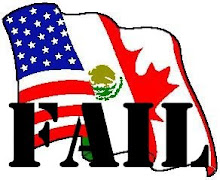Apparently there isn’t one judging by the comments given by Janet Napolitano, the US Secretary of Homeland Security, at a recent Canada/US border conference in Washington. A few excerpts…
"One of the things that we need to be sensitive to is the very real feelings among southern border states and in Mexico that if things are being done on the Mexican border, they should also be done on the Canadian border,"
“We shouldn't go light on one and heavy on the other.”
"This is one NAFTA, one area, one continent, and there should be parity there. I don't mention this to suggest that everyone in this room will agree with that, I mention it to suggest it's something I have to deal with, and so I ask for your sympathy."
Let’s think about this. First of all, Canada is not being run by wild gangs on our border. Canada is not funnelling weapons from the US. Canada does not have people crossing the border in the thousands trying to live illegally there…we go to visit, not to stay. And while I don’t deny that attempts are made to bring drugs into the US through Canada, I would wager that it doesn’t even come close to the amount being passed through the US/Mexico border.
The argument that the US shouldn’t go light on one and heavy on the other makes no sense. On one border, you have obvious issues. On another, you have a friendly country that has been a solid trading partner with no related issues.
She also comments on the nature of border communities being too friendly as an issue…
"It's as though there's not a border at all. People are used to going back and forth, and the hockey teams go back and forth.... People just don't think of it as two different countries. But the reality exists that there's a border there."
So because Mexico and the US have horrible border-town experiences, that negates the decades of positive relationships built between Canadian and US border towns? And never mind the border towns: If you drive to Grand Forks on a long weekend, you’ll see just as many Manitoba license plates as you will North Dakota ones. The southern border states may not benefit from commerce from those coming up from Mexico, but the northern states definitely do benefit from Canadians coming down and putting into their economy…just like Canada benefits from Americans coming north. We’ve lived as good neighbours for decades, and now that should be squashed because of a bad neighbour thousands of miles away?!
This is a disturbing and insulting thought: that the US will consider Canadians crossing over the same as those from Mexico, on the sole ground that we’re foreigners; history, relationship, and commerce be damned!
In a recent interview, former Canadian politician David Emerson talked about the withering NAFTA advantage here in post 9/11, and he’s right. For one, NAFTA is outdated. In the 90’s, Computer Systems Analyst was a viable job title. Ask 10 professionals in the IT industry today, and I guarantee none of them will refer to themselves as that. The list of allowable professions needs a major retool. But why bother, when a country can simply disregard their commitments in light of current events?
James Travers from The Star did a great opinion piece talking about the border situation. He points out that both Canada and the US need to maybe re-think the ramifications that a more stringent border will produce:
It's hard to imagine much that's more urgent than nurturing a relationship that includes $600 billion in annual two-way trade and provides the U.S. with, among other things, secure energy.
For the US this is especially true for a couple of reasons.
For one, the economy will eventually get better and when it does they may find too many bridges to the north have been burned.
For another, Canada is finally realizing that they can’t just rely on their continental neighbour as much as in the past. Canada’s trade minister, Stockwell Day, is currently on a tour of China and Japan and will announce plans to open six new trade offices in China. Canada is also looking at entering a free trade agreement with Europe.
I have no doubt that there are tremendous issues along the Mexico/US border, and I have friends who live along those southern states who feel strongly about the topic. But for the US government to assume that the Canada/US border should be on parity with the Mexico/US border “just because” is irrational. It’s a black-and-white decision being made without any consideration of the established relationship with Canada and I’m guessing without the consultation of the northern states and bordering provinces on how implementing this will affect them.
Janet Napolitano asked the border conference audience for sympathy as she deals with this, and I have no doubt that this is a difficult decision to make considering the many passionate sides of the debate. But I would ask her to try and look at the big picture and the long term implications that making stronger protectionist actions will result in. As a Canadian, I love the United States. But if the US doesn’t want to be as friendly anymore, there are others willing to fill that role.




No comments:
Post a Comment